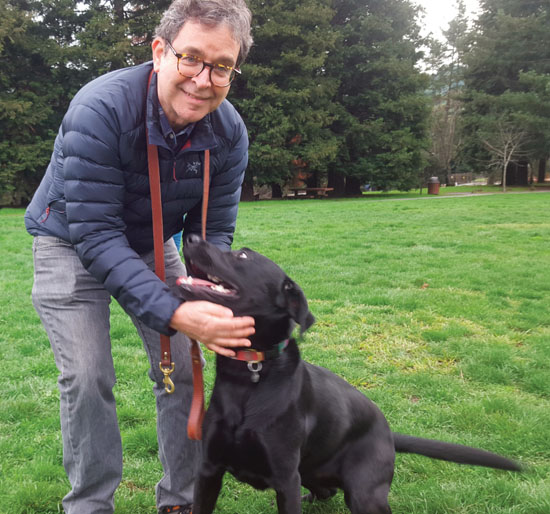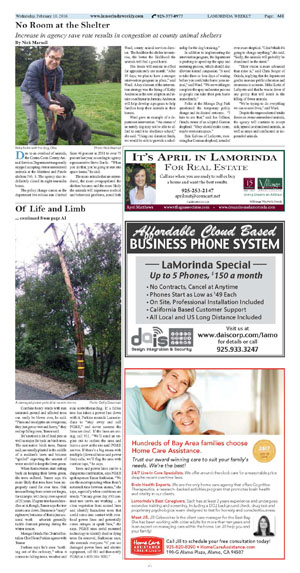|
|
Published February 10th, 2016
|
No Room at the Shelter
|
| Increase in agency save rate results in congestion at county animal shelters |
| By Nick Marnell |
 |
| Mike Kotin with his dog, Ollie Photo Nick Marnell |
Due to an overload of animals, the Contra Costa County Animal Services Department temporarily stopped accepting owner surrendered animals at the Martinez and Pinole shelters Feb. 3. The agency also indefinitely closed its night surrender boxes.
 The policy change comes as the department live release rate climbed from 46 percent in 2011 to over 75 percent last year, according to agency representative Steve Burdo. "When you do that, you're going to run into space issues," he said.
The policy change comes as the department live release rate climbed from 46 percent in 2011 to over 75 percent last year, according to agency representative Steve Burdo. "When you do that, you're going to run into space issues," he said.
 The more animals that are surrendered, the more overpopulated the shelters become and the more likely the animals will experience medical and behavioral problems, noted Beth Ward, county animal services director. The healthier the shelter inventories, the better the likelihood the animals will find a good home.
The more animals that are surrendered, the more overpopulated the shelters become and the more likely the animals will experience medical and behavioral problems, noted Beth Ward, county animal services director. The healthier the shelter inventories, the better the likelihood the animals will find a good home.
 The freeze will remain in effect for approximately one month. "After 30 days, we plan to have a stronger intervention program in place," said Ward. A key element of the intervention strategy was the hiring of Kathy Anderson as the new adoption and intake coordinator in January. Anderson will help develop a program to help families keep their animals in their homes.
The freeze will remain in effect for approximately one month. "After 30 days, we plan to have a stronger intervention program in place," said Ward. A key element of the intervention strategy was the hiring of Kathy Anderson as the new adoption and intake coordinator in January. Anderson will help develop a program to help families keep their animals in their homes.
 Ward gave an example of a department intervention. "An owner of an unruly dog may not be able to afford to send it to obedience school," she said. "Using our donation funds, we would be able to provide a scholarship for the dog's training."
Ward gave an example of a department intervention. "An owner of an unruly dog may not be able to afford to send it to obedience school," she said. "Using our donation funds, we would be able to provide a scholarship for the dog's training."
 In addition to implementing the intervention program, the department is pushing to speed up the spay and neutering process, which should also alleviate kennel congestion. "It used to take three or four days of waiting before you could take home your animal," said Ward. "We are working to complete the spay and neuter process so people can take their pets home immediately."
In addition to implementing the intervention program, the department is pushing to speed up the spay and neutering process, which should also alleviate kennel congestion. "It used to take three or four days of waiting before you could take home your animal," said Ward. "We are working to complete the spay and neuter process so people can take their pets home immediately."
 Folks at Rancho Laguna Park in Moraga questioned the temporary policy change and its desired outcome. "I hate to see that," said Joe Udliner, Orinda owner of an adopted German shepherd. "They should make room, maybe rent extra space."
Folks at Rancho Laguna Park in Moraga questioned the temporary policy change and its desired outcome. "I hate to see that," said Joe Udliner, Orinda owner of an adopted German shepherd. "They should make room, maybe rent extra space."
 Erin Kalvass of Lafayette, exercising her German shepherd, sounded even more skeptical. "I don't think it's going to change anything," she said. "Sadly, the animals will probably be abandoned on the street."
Erin Kalvass of Lafayette, exercising her German shepherd, sounded even more skeptical. "I don't think it's going to change anything," she said. "Sadly, the animals will probably be abandoned on the street."
 "Their vision is more advanced than mine is," said Chris Seeger of Orinda, implying that the department goal to increase public education and awareness is accurate. Mike Kotin of Lafayette said that he was in favor of any policy that will result in the killing of fewer animals.
"Their vision is more advanced than mine is," said Chris Seeger of Orinda, implying that the department goal to increase public education and awareness is accurate. Mike Kotin of Lafayette said that he was in favor of any policy that will result in the killing of fewer animals.
 "We're trying to do everything we can to save lives," said Ward.
"We're trying to do everything we can to save lives," said Ward.
 Despite the unprecedented intake freeze on owner surrendered animals, the agency will continue to accept sick, injured or abandoned animals, as well as strays and confiscated or impounded animals.
Despite the unprecedented intake freeze on owner surrendered animals, the agency will continue to accept sick, injured or abandoned animals, as well as strays and confiscated or impounded animals.


|
|
|
|
|
|
|
|
|
| |
|
|
|
|



